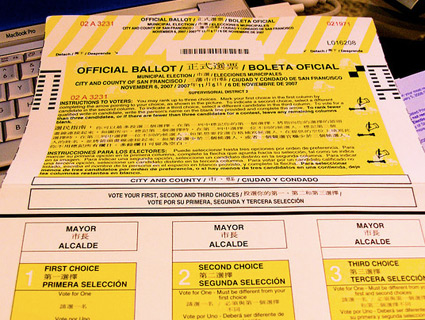
<a href="http://www.flickr.com/photos/37996588780@N01/1839524552/">John Manoogian III</a>/Flickr
As Republican primary voters head to the polls in Florida on Tuesday, both GOP front-runners have endorsed a policy that would contradict existing law and could disenfranchise millions of voters across the country.
During a recent debate, both Newt Gingrich and Mitt Romney supported getting rid of bilingual ballots when the topic was brought up by the moderator. “I would have ballots in English,” Gingrich said. “And I think you could have programs where virtually everybody would be able to read the ballots.” Romney agreed. “I think Speaker Gingrich is right with regards to what he’s described,” he said.
That wasn’t much of a stretch for Gingrich, who once called Spanish “the language of living in a ghetto.” Yet their glib demand for English-only ballots would require amending the Voting Rights Act and doing away with hard-won legal requirements that have existed for decades. It’s a sharp turn away from the Bush administration, which despite a spotty civil rights record filed more ballot access cases on behalf of non-English speakers than any administration had before.
“We used to have poll taxes, we used to have whites-only primaries, we used to not let women vote,” says Myrna Perez, senior counsel with the Brennan Center’s Democracy Program. “Policies that would make our ballots less accessible to Americans based on what language they speak would be at odds with that historical arc towards expanding the franchise.”
Bilingual ballots are no abstract issue in Florida, which has a sizeable population of Americans whose first languages are Spanish or Haitian Creole. “The Haitian population is a voting bloc, the Hispanic community is a voting bloc,” says Carolyn Thompson, a Florida-based activist with the Advancement Project, a civil rights group. “They pay taxes, they’ve won the right to vote in their language.”
Under the 1975 revision of the Voting Rights Act, communities whose non-English speaking populations reach a certain level have to provide voting materials in alternate languages.
There are 238 jurisdictions covered by the Voting Rights Act’s language requirements. It’s hard to tell how many voters would be impacted by the repeal of those provisions, but the census estimates that there are more than 19 million eligible voters who come from the communities the law is meant to serve. Ten counties in Florida are among them, four of which went Republican in the last presidential election.
“Some of these ballot measures involve very complex legal language,” Camila Gallardo of the Latino civil rights organization National Council of La Raza points out. “Some of the language is hard to understand even for fluent English speakers, let alone if your first language isn’t English.”
Republicans have long had a complex relationship with Florida. It’s the site of great conservative victories, like George W. Bush seizing the presidency in 2000 and Marco Rubio crushing his challengers in 2010’s Senate race. But it’s also the kind of place where moderates like Jeb Bush and Charlie Crist thrive, a cosmopolitan state that anti-immigrant ex-GOP congressman Tom Tancredo once compared to the Tower of Babel. That’s why Gingrich followed up Monday’s debate with an appearance on the Spanish-language station Univison in which he called Romney’s draconian approach to curtailing illegal immigration an “Obama-level fantasy,” and why Romney turned Gingrich’s remarks about Spanish being “ghetto” into a campaign ad. In Florida, a Republican who comes off as anti-immigrant or anti-Hispanic could see their political ambitions cut short fast. It’s a difficult balancing act for members of a party that is seen as increasingly hostile by Latino voters, who are becoming more influential in American elections.
“They try to appeal to Latinos and Florida and during the general election, but everywhere else they’re trying to be tough guys,” says Dr. Gary Segura of the national polling firm Latino Decisions. “It’s going to be very difficult for them to have it both ways.”
More than 1 out of 10 Republican primary voters is Latino in Florida, so it’s possible that Romney and Gingrich’s commitment to English primacy, if applied, could disenfranchise part of their own base in the state. Or they could just be banking on the possibility that their voters are more likely to be completely bilingual.
“The Cuban population heavily concentrated in the Republican Party are bilingual, fluent, are likely to be able to hang with that,” says Segura. “Some number of Republicans would be disenfranchised, but the largest number would be first-generation Puerto Rican Democrats.”
Changing federal law isn’t easy of course, and the Voting Rights Act was renewed in 2006 for another 25 years. By the time it’s up for consideration again, Republicans might have even less interest in ensuring that language minorities have equal access to the ballot box, even in Florida.
“For a long time, Cubans were staunchly in the Republican column, although that demographic is really changing,” says Gallardo. “[Today] you see a lot of young Hispanics registering with no party affiliation.”








